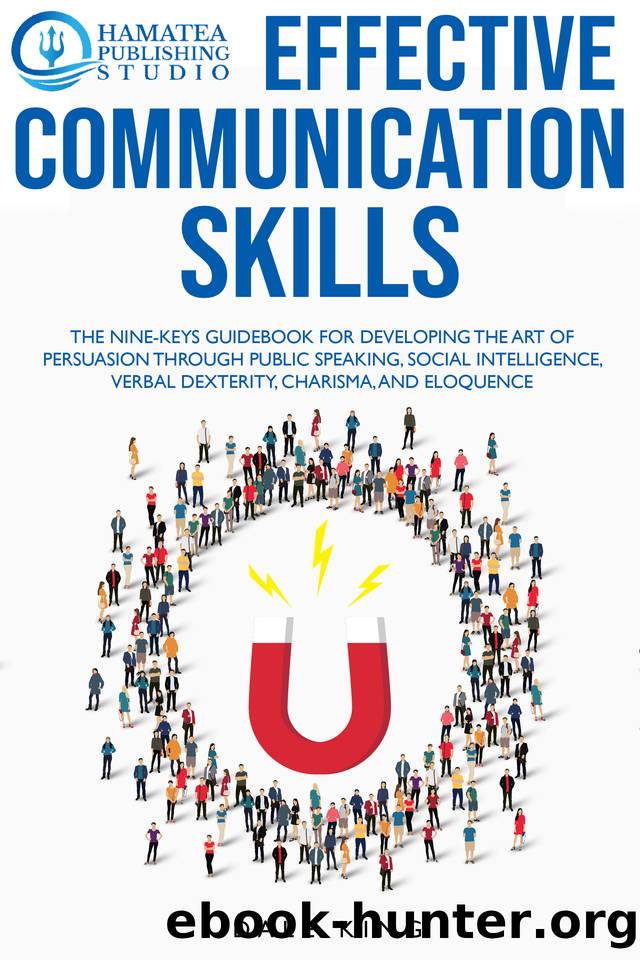EFFECTIVE COMMUNICATION SKILLS: The Nine-Keys Guidebook for Developing the Art of Persuasion through Public Speaking, Social Intelligence, Verbal Dexterity, Charisma, and Eloquence by King Dale

Author:King, Dale [King, Dale]
Language: eng
Format: epub
Published: 2021-01-15T16:00:00+00:00
When you are able to understand how a person feels or what they are thinking, it will be easier to interact with them. There is also a nonverbal part of interactions with others that needs a little extra attention. The knowledge that you gain from empathy is able to help you to use the best nonverbal communication.
Think about this, you have picked up on the fact that your friend is upset, so you ask him, âWhatâs wrong?â But your tone of voice is way too cheerful. How do you think your friend is going to view that? They wonât think you actually care. If you change your tone, though, to sound concerned and sympathetic, your friend will believe that you care and want to hear why they are upset.
I know at this point, empathy seems like a lot of work, but I promise you, it will become second nature. When you add in the need to manage your nonverbal cues, along with everything else we have covered, empathy may come off as overwhelming.
Not to worry, though, nonverbal empathy is the simplest part. Similar to how body language boils down to two things, there are two parts of nonverbal empathy: if you should be high-energy or low-energy.
When a person has high energy, they will be loud, expressive, and excited.
If a person has low energy, they will be quiet, relaxed, and reserved.
Now, high energy does not always mean that the person is happy, and low energy does not always dictate sadness. Somebody who has won the lottery can jump up and down and run around, or they can simply lean backward with a satisfied smile on their face. Both of these are happy responses to winning the lottery, but one uses high energy and the other low.
You should also remember that a person wonât always be high or low energy. So instead of saying something like, âMy friend always has high energy,â it is more accurate to say, âMy friend has high energy right now.â
So how does all of this play into empathy? If your friend is currently displaying high energy, then you should respond with high energy. The same goes if they are displaying low energy.
Take this, for example. You and your friend are out for dinner. Your friend has had a long day and they arenât as boisterous as normal. They have low energy. But you are excited. You gush about how great the food is and you act out in an excited and expressive way. Your friend, on the other hand, just sits and pick at their food and wants you to settle down so that they can talk to you.
You are high energy and they are low energy. Your friend simply wants to have a restful evening while you are acting goofy. Since you two have a mismatch in energy, it is harder for you to really connect with them.
If you are able to match your friendâs energy, the evening is going to go a lot better. You should only match it and not exceed it.
Download
This site does not store any files on its server. We only index and link to content provided by other sites. Please contact the content providers to delete copyright contents if any and email us, we'll remove relevant links or contents immediately.
The Concise Laws of Human Nature by Robert Greene(1902)
Bioenergetica by Alexander Lowen(1472)
After by Bruce Greyson(1406)
The Child in You by Stefanie Stahl(1257)
No Bad Parts by Richard C. Schwartz(1239)
Stress-Proof Your Brain The Yogic Way: Unique Ancient Indian Techniques to End Toxic Stress, Stop Worrying and Inculcate Mental Toughness by Advait(1128)
The Power of Myth by Joseph Campbell & Bill Moyers(1058)
Talk of the Ton by unknow(1053)
Badass Habits: Cultivate the Awareness, Boundaries, and Daily Upgrades You Need to Make Them Stick by Jen Sincero(1040)
Chakras & Self-Care by Ambi Kavanagh(960)
Living a Life of Awareness by Don Miguel Ruiz Jr(934)
Learn To Think Using Thought Experiments by King Patrick(908)
Self-Care for Empaths by Tanya Carroll Richardson(907)
The Mind by E. Bruce Goldstein(899)
The 7 Secrets of Sound Healing Revised Edition by Jonathan Goldman(888)
Curative Magic by Rachel Patterson(877)
The Quantum Psychiatrist: From Zero to Zen Using Evidence-Based Solutions Beyond Medication and Therapy by Biswas Dona(875)
The Tao of Intimacy and Ecstasy by Solala Towler(871)
The Anxiety First Aid Kit by Rick Hanson(846)
